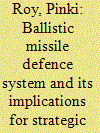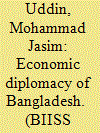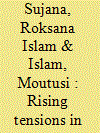|
|
|
Sort Order |
|
|
|
Items / Page
|
|
|
|
|
|
|
| Srl | Item |
| 1 |
ID:
154781


|
|
|
|
|
| Summary/Abstract |
The technological evolution and proliferation of ballistic missile defence (BMD) systems in the last two decades have ushered in the beginning of a new wave of strategic concern amongst security experts. The BMD attempts to unbalance the global strategic stability primarily founded on the strategy of nuclear retaliation. President George W. Bush administration further aggravated this threat to the global security order when he unilaterally withdrew the support of the United States (US) from the Anti-Ballistic Missile (ABM) Treaty. The approach of the US to strengthen its defence system has pushed other states to either pursue their own costly BMD system or reassure themselves through some new offensive strategies such as increasing number of nuclear arsenals. South Asia has not remained untouched from these global developments. In recent years, this region has witnessed a rapid proliferation of defensive and offensive ballistic missiles. This article aims to analyse the functioning of BMD system and its causal relation to the nuclear deterrence. In the context of South Asia, it seeks to explore the triangular strategic relationship among India, China and Pakistan within the broader framework of their BMD system.
|
|
|
|
|
|
|
|
|
|
|
|
|
|
|
|
| 2 |
ID:
154780


|
|
|
|
|
| Summary/Abstract |
The paper focuses on Bangladesh’s foreign trade-specific economic diplomacy. It argues that several important issues of such economic diplomacy need to be dealt with by relevant actors particularly the Government of Bangladesh and its foreign trade enhancing agencies at multi-level platforms. It finds that considering various trade uncertainties and addressing their likely adversities, reducing bilateral trade gap with major trading partners, moving towards global and regional value chains, and reducing tariff and non-tariff barriers are the most important issues of Bangladesh’s trade diplomacy. Other issues are tariff concessions, preferential tariffs, flexible rules of origin, special and differential treatment, duty free quota free market access, exploiting benefits of duty free quota free market access already provided by several states and export promotion. The paper concludes that some vital instruments can be adopted to deal with these issues, which include finalising and updating legally binding contracts, strengthening the role of Bangladeshi missions abroad, delinking trade diplomacy at multiple levels, engaging Bangladeshi diaspora, exercising consular and commercial diplomacy, increasing skills of trade negotiators and promoting ‘Brand Bangladesh’.
|
|
|
|
|
|
|
|
|
|
|
|
|
|
|
|
| 3 |
ID:
154784


|
|
|
|
|
| Summary/Abstract |
This paper is an attempt to analyse the methodological and ethical challenges required for conducting research in multi-ethnic societies situated in conflict zone. Based on secondary sources of information, this article has proposed the essential ethical and methodological principles for conducting research in a conflict zone and how the confidentiality and anonymity of the research, as well as the rights and dignity of the respondents are ensured as per the ethics guidelines. This paper particularly aims to advance the knowledge and guidelines on methodology and ethical issues for novice researchers and graduate students who work and intend to work in a conflict area, or in a postconflict society where multi-ethnic communities are living under a latent or manifest form of conflicts and human rights violation.
|
|
|
|
|
|
|
|
|
|
|
|
|
|
|
|
| 4 |
ID:
154782


|
|
|
|
|
| Summary/Abstract |
The paper seeks to assess the reasons behind rising tensions in the South China Sea and its implications. It finds that geopolitical significance, abundance of energy resources and fisheries are some of the factors responsible. The rebalance strategy of the United States (US), China’s strategic posture and involvement of claimant and non-claimant actors have intensified tensions by ongoing militarisation in the region. In addition, the dispute has direct impacts on energy security and depletion of fish stocks. It also affects the regional and international order by questioning the efficiency of the Association of Southeast Asian Nations (ASEAN) and the United Nations (UN) to address the tensions properly. However, by analysing the threat potentials, the paper argues that though there is a significant chance of conflict, the claimant parties - China and the US would not involve in any major military confrontation that would hamper their stable working relationship.
|
|
|
|
|
|
|
|
|
|
|
|
|
|
|
|
| 5 |
ID:
154783


|
|
|
|
|
| Summary/Abstract |
Brexit is a significant development in global economy and politics which, in near future, is going to shape the politics and economic policies in the United Kingdom (UK), Europe and beyond. As such, Brexit has raised significant discussion in the academia and policy level all over the world. As a part of this discussion, this paper aims to advance the discussion through identifying the factors which led the UK people towards Brexit. It reveals that European Union (EU) membership is an over-all benefit for the UK, particularly in cases of trade, investment and negotiating power and before the referendum most of the estimates, if not all, depicted a gloomy picture of the UK economy after Brexit. Yet, majority of the UK people voted for Brexit because they had been suffering from some ‘real’ problems for a long time - lower wage, tight housing market and overcrowded schools and hospitals, for which they wrongly held the EU and the immigrants liable, being influenced by their politicians as well as by their long-standing anti-EU sentiment. The paper reveals that ‘real’ causes of the sufferings of the UK people lie in the two basic features of the structure of the UK economy: growing financialisation and neoliberal path of development. Therefore, it can be said that financialisation and neoliberalism were the ultimate factors which, being strengthened by other political factors, led the country towards Brexit.
|
|
|
|
|
|
|
|
|
|
|
|
|
|
|
|
|
|
|
|
|